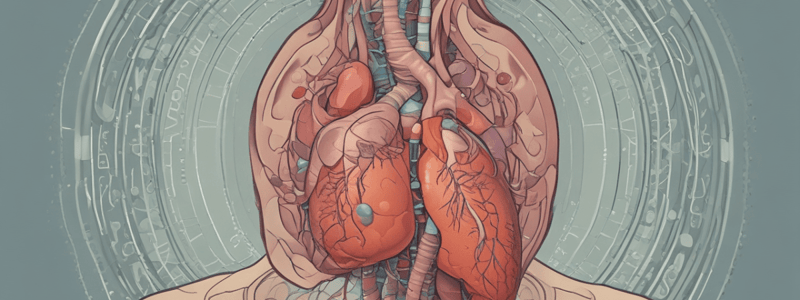Podcast
Questions and Answers
What is the primary mechanism behind inflammation of the liver and liver damage in Hepatitis?
What is the primary mechanism behind inflammation of the liver and liver damage in Hepatitis?
- Immune cells producing excessive cytokines
- Immune cells attacking healthy hepatocytes
- Virus causing infected hepatocytes to express abnormal protein on their surface, leading to immune cell destruction (correct)
- Virus targeting and killing immune cells
Which of the following is NOT a common symptom of Hepatitis?
Which of the following is NOT a common symptom of Hepatitis?
- Jaundice and increased bilirubin
- Fever and malaise
- Atypical neutrophilia (correct)
- Hepatomegaly and increased serum transaminases
What is the gold standard for diagnosing HCV infection?
What is the gold standard for diagnosing HCV infection?
- HCV RNA testing using PCR (correct)
- HCV IgG antibody testing
- Liver biopsy
- HCV IgM antibody testing
What is the significance of HAV IgG in Hepatitis A?
What is the significance of HAV IgG in Hepatitis A?
Which type of Hepatitis is often associated with Diabetes Mellitus and Metabolic Syndrome?
Which type of Hepatitis is often associated with Diabetes Mellitus and Metabolic Syndrome?
What is the significance of IgM anti-HBc in Acute Hepatitis B infection?
What is the significance of IgM anti-HBc in Acute Hepatitis B infection?
What is the term for the scarring of the liver that can occur in Chronic Hepatitis?
What is the term for the scarring of the liver that can occur in Chronic Hepatitis?
What is the term for the inflammation of the liver characterized by giant cells?
What is the term for the inflammation of the liver characterized by giant cells?
What is the term for the increased production of bilirubin in the blood, leading to yellowing of the skin and eyes?
What is the term for the increased production of bilirubin in the blood, leading to yellowing of the skin and eyes?
What is the term for the chronic liver failure that can occur in Chronic Hepatitis?
What is the term for the chronic liver failure that can occur in Chronic Hepatitis?
What is the mechanism of action of Ribavirin?
What is the mechanism of action of Ribavirin?
What is the primary indication for Pegylated Interferon?
What is the primary indication for Pegylated Interferon?
What is the characteristic of Sofosbuvir that makes it a preferred treatment option?
What is the characteristic of Sofosbuvir that makes it a preferred treatment option?
What is the difference between Sofosbuvir and Ledipasvir?
What is the difference between Sofosbuvir and Ledipasvir?
What is the treatment approach for Hepatitis A?
What is the treatment approach for Hepatitis A?
What is the effectiveness of Sofosbuvir with Ribavirin and Interferon in treating HCV genotype 1?
What is the effectiveness of Sofosbuvir with Ribavirin and Interferon in treating HCV genotype 1?
What is the primary indication for Elbasvir + Grazoprevir (Zepatier)?
What is the primary indication for Elbasvir + Grazoprevir (Zepatier)?
What is the contraindication for Ribavirin?
What is the contraindication for Ribavirin?
What is the characteristic of Pegylated Interferon?
What is the characteristic of Pegylated Interferon?
What is the cost of Sofosbuvir?
What is the cost of Sofosbuvir?
Flashcards are hidden until you start studying
Study Notes
Hepatitis
- Inflammation of the liver, characterized by inflammatory cells in liver tissue
- Often asymptomatic, leading to jaundice, poor appetite, and malaise
- Acute hepatitis lasts less than 6 months, while chronic hepatitis lasts more than 6 months
Chronic Hepatitis
- May initially have no symptoms
- Progresses to fibrosis (scarring) and cirrhosis (chronic liver failure)
- Increases the risk of hepatocellular carcinoma
Causes of Hepatitis
- Viral hepatitis (most common cause of liver inflammation worldwide)
- Alcoholic hepatitis
- Toxic/drug-induced hepatitis
- Autoimmune hepatitis
- Non-alcoholic fatty liver disease (often associated with diabetes and metabolic syndrome)
- Ischemic hepatitis (often associated with heart failure)
- Giant cell hepatitis (rare, affecting newborns and children)
Pathophysiology
- Virus targets hepatocytes, causing them to express abnormal proteins on their surface
- Immune cells destroy infected hepatocytes
- Main mechanism behind liver inflammation and damage
Symptomatology
- Fever, malaise, and nausea due to immune system response
- Hepatomegaly and transaminase leakage into blood, causing increased serum transaminases (ALT > AST)
- Atypical lymphocytosis common due to viral antigen stimulation
- Jaundice, increased bilirubin (conjugated and unconjugated), and increased urobilinogenuria
HAV Serology
- HAV IgM indicates active infection
- HAV IgG indicates protective antibody, recovery, or previous vaccination
HCV Serology
- HCV RNA testing using PCR is the gold standard
- Detects virus early, even 1-2 weeks after infection
- Detects levels of viral RNA in the blood
- Decrease in levels indicates recovery, while no change indicates chronic HCV
Treatment of Hepatitis
Treating HAV
- Maintain nutrition and hydration
- Practice good personal hygiene to prevent spread
- No antiviral medications indicated due to spontaneous resolution in almost all patients
- Post-exposure prophylaxis with Hepatitis A vaccine or immunoglobulin for unvaccinated individuals
Treating HCV
- Antiviral medication treatment recommended for all people with chronic HCV
- Initial treatment depends on genotype of HCV identified
Effectiveness of Treatments
- Sofosbuvir (Sovaldi) with ribavirin and interferon is 90% effective for genotypes 1, 4, 5, or 6
- Sofosbuvir with ribavirin is 70-95% effective for genotypes 2 and 3
- Ledipasvir (Harvoni) with sofosbuvir is 93-99% effective for genotype 1, but expensive
- Ribavirin and peginterferon is 60-90% effective for genotype 6
Anti-HBV Drugs
- Lamivudine (3TC)
- Adefovir (Hepsera)
- Entecavir (Baraclude)
- Telbivudine (Tyzeka)
- Tenofovir (Viread)
- Peginterferon (first-line agents for treating HBV)
Studying That Suits You
Use AI to generate personalized quizzes and flashcards to suit your learning preferences.




